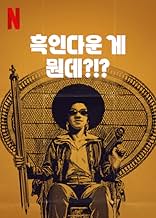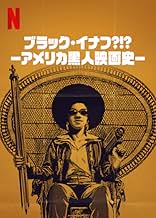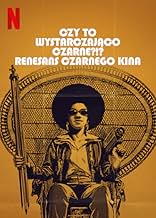El historiador y crítico cultural Elvis Mitchell analiza el cine afroamericano desde sus orígenes hasta la revolución de las influyentes películas de los años 70.El historiador y crítico cultural Elvis Mitchell analiza el cine afroamericano desde sus orígenes hasta la revolución de las influyentes películas de los años 70.El historiador y crítico cultural Elvis Mitchell analiza el cine afroamericano desde sus orígenes hasta la revolución de las influyentes películas de los años 70.
- Dirección
- Guión
- Reparto principal
- Premios
- 4 nominaciones en total
- Self
- (as Louise Archambault Greaves)
- Self
- (as Jim Signorelli)
Reseñas destacadas
The bad: but after an hour this documentary veers of into all sorts of directions, becoming disjointed and long in the tooth.
It is as if this director simply had no control over his urge to namedrop as many film classics as possible and then start analysing what was wrong with them.
Recommended watch for the first hour, but I fear not many will stay focussed till the very end, because this documentary unfortunately peters out after the first hour.
One of the more unexpected aspects is it's inclusion of experimental films, from animation to split screen. There is minimal focus on this but it does highlight ambitious storytelling and filmmakers responses to a restrictive system.
Mitchell breaks down how Black filmmakers and actors fought to define themselves on screen, pushing past racist tropes and reclaiming space in an industry that never wanted to give them a real seat at the table. He doesn't just highlight classics - he contextualizes them, showing how these films weren't just entertainment but acts of defiance and self-determination. And the archival footage? Incredible. The interviews? Stacked. When you've got Samuel L. Jackson, Laurence Fishburne, and Whoopi Goldberg weighing in, you know it's legit.
Beyond the history, what makes this film so powerful is how it connects the dots to today. Hollywood still sidelines Black voices, still erases contributions, still acts like representation is a trend rather than a necessity. Mitchell makes it clear that these battles aren't new, and that's what makes this documentary so frustrating-but also so important.
If you care about film, Black culture, or just understanding why things are the way they are in Hollywood, Is That Black Enough for You?!? Is essential. It's eye-opening, validating, and at times infuriating, but more than anything, it's a reminder that Black cinema has always been about more than just movies - it's about power.
The documentary mainly focuses on Blaxploitation movies of the 1970s, basically 1968-76, the introductory bit deals with movies before that time. Killer of Sheep and Symbiopsychotaxiplasm get special non-Blaxploitation mentions. I'm not sure I heard Blaxploitation discussed from an afro-american perspective before, certainly not to this extend. Like most people of my generation I learned of these films first from Tarantino. Who as Mitchell points out here got his start by putting dialogues common in black films into the mouth of his white actors. Which, as much as you might dislike that take, is true. And yes you want so say: But, Samuel L. Jackson... and I tell you: he is not in Reservoir Dogs. Now, is he? He is in this documentary though.
Mitchell make quite a number of other interesting point throughout, highlights some of the forgotten pioneers and gives you a good overview of the film of that time. Unless you are easily offended by black view points and you are interested in movies, this is way worth your time. Does it at times makes points I disagree with. Sure, but I am an adult, I don't need people to agree with me 100% to find it interesting what they have to say. And yes sure it could have talked about more or other movies, but it already crammed a lot into it's run time.
Ps. I read in another review here that is very telling that Sidney Poitier wasn't interviewed for this. No, it isn't. Poitier already quite sick by that time, do your f--ing research. Do you really think Poitier was not aware of the things Mitchell says about his career? I'm a white European and I was aware of them beforehand. Also, if you want to know why Roots isn't discussed, because this is about movies not TV.
¿Sabías que...?
- PifiasWhile discussing Cadena perpetua (1994), the narrator identifies Rita Hayworth as white. Hayworth's real name was Margarita Carmen Cansino, and she was of Romani descent (an Indo-Aryan ethnic group, also known by the term "Gypsies"). She had her name changed, and appearance slightly altered, to aid her career. Prior to that, as Rita Cansino, she had been limited to smaller exotic roles.
On a related note, towards the end of The Shawshank Redemption, Andy has replaced the poster of Rita Hayworth with a poster of Raquel Welch. Welch was born Jo Raquel Tejada, but went by "Raquel Welch" for the sake of her career (to avoid getting trapped into roles available to Latinas). She did not acknowledge her true heritage until she worked on American Family (2002).
- Citas
Harry Belafonte: Not one picture that I turned down did I regret not doing. I didn't resent any of them. I'm glad others got an opportunity and went off and did it, but my initial... First and foremost, I'm an artist. I'm an actor. And I came out of a school with Marlon Brando, Walter Matthau, Rod Steiger, Tony Curtis, with a director that gave us no quarter. I'm not gonna do anything other than what I think is worthy of being done. And fortunately for me, I was a runaway success in the world at large because I had a globe so passionately approving of my presence in their midst that nobody could dismiss the fact that that thing on the horizon called Belafonte could really not be fucked with. Because anytime anybody came up and gave me an ultimatum, I said, "Fuck you. I'm going to Paris. I'll probably live there if I like, but I... I have a destination that answers your denial of what I could be."
- ConexionesFeatures A Fool and His Money (1912)
Selecciones populares
- How long is Is That Black Enough for You?!??Con tecnología de Alexa
Detalles
- Fecha de lanzamiento
- País de origen
- Sitio oficial
- Idioma
- Títulos en diferentes países
- Is That Black Enough for You?!?
- Empresas productoras
- Ver más compañías en los créditos en IMDbPro
- Duración2 horas 15 minutos
- Color
- Mezcla de sonido
Contribuir a esta página






































